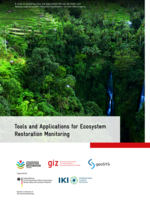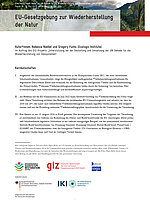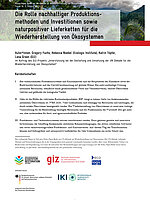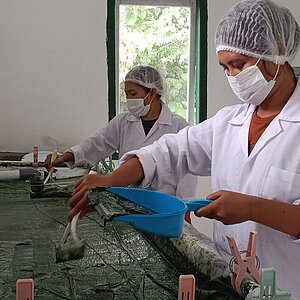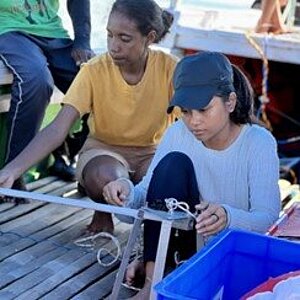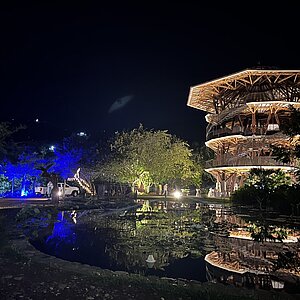UN World Environment Day 2021 launches #GenerationRestoration

This year’s World Environment Day starts not with action but a new vision: a new and proactive approach that sees humankind as part of the natural world.
This year’s World Environment Day is all about restoration of nature that has been degraded and destroyed by humans. 5 June marks the official start of the UN Decade on Ecosystem Restoration 2021–2030. “There has never been a more urgent need to restore damaged ecosystems than now,” write UN Decade partner organisations UNEP and FAO. “Ecosystems support all life on Earth. The healthier our ecosystems are, the healthier the planet – and its people.”
Preventing, stopping and reversing the degradation of ecosystems and oceans is the ambitious goal of the UN Decade on Ecosystem Restoration. These activities will work to end poverty, counteract global warming and prevent mass extinctions. #GenerationRestoration – the aim is to start a global movement for the restoration of our planet.
Restoring nature – but which nature?
In the geological era of the anthropocene – an era where humans are actively altering the planet – ecosystem restoration raises a number of key questions. If anthropogenic global warming, inputs of pollutants worldwide and the overuse of natural resources has meant the virtually wholesale destruction of pristine wilderness, then what states are we actually looking to protect or restore in relation to ecosystems?
Although previously thought to be static, ecosystems are in fact dynamic systems and therefore ever-changing. Modern conservation efforts therefore focus instead on protecting processes, i.e. prioritising the preservation and restoration of natural and dynamic processes, collectively referred to as ‘ecosystem services’. More narrowly defined, this strategy refers to non-intervention in natural processes within ecosystems. Looking at the bigger picture, this is also understood to mean the integration of conservation issues into the sustainable use of cultural landscapes.
The UN Decade and IKI
The IKI project ‘Conservation of biodiversity, seagrass ecosystems and their services’ focuses on biodiversity conservation, and the protection of seagrass beds and their ecosystem services. The project is also addressing food security and protecting the resilience of vulnerable coastal communities in a changing climate. Seagrass is an important source of food for dugongs and other marine animals: it provides important ecosystem services such as fishery productivity and carbon sequestration. Seagrass ecosystems are in retreat worldwide as a result of pressure from coastal development, fishing and boating, environmental pollution and climate change. Data is also lacking about their condition and the services that they provide. This project is closing these gaps in knowledge by involving local NGOs and communities. NGOs are being trained to conduct participative research, to enable them to collect data and identify important areas of seagrass beds. This information is then used to involve communities and decision-makers in the development of seagrass protection strategies. In addition, the project is introducing alternative business models aimed at improving livelihoods and providing funds for seagrass protection. This will improve the long-term prospects for Indo-Pacific seagrass ecosystems.

The ‘Public-private-people partnerships - a concept to combine biodiversity and economic developments in coastal forests’ project arose as a direct result of the Bonn Challenge, and applies the concept of public-private-people partnerships (PPPPs) to achieve a better balance between biodiversity and usage interests in coastal forests in Kenya. Project goals include the protection and restoration of key forest and mangrove ecosystems in Kwale County. These ecosystems are being protected from the impact of major investment programmes by the integration of environmental and social standards. This is being achieved with the establishment of public-private-people partnerships. The project is working together with communities, government agencies and the private sector to achieve ecosystem restoration, sustainable resource management, and to account for both environmental and social standards in policy and development planning. New drivers for ecosystem destruction are also being tackled, and the project is also helping to strengthen the capabilities of local communities to influence government policymaking and the wider application of standards.
The new IKI project ‘Support for the design and implementation of the UN Decade on Ecosystem Restoration’ offers direct support to the UN Decade. The Decade is planned as a direct contribution to the objectives of the three Rio conventions and to the sustainable development goals (SDGs). For its part, the project aims to support key actors in their efforts to put the UN Decade implementation strategy for ecosystem restoration into practice. Insights into ecosystem restoration will be applied and provided to the international community with the aim of being disseminated by means of dialogue platforms. Knowledge sharing will utilise synergy effects with partners cooperating on the Decade, such as IUCN, the Global Landscapes Forum and the World Economic Forum. A list of partner countries will be drawn up to receive support for capacity building and method optimisation, in close cooperation with ongoing projects and implementation initiatives from the Bonn Challenge for ecosystem restoration.
Outlook
Reimagine. Recreate. Restore. The slogan for World Environment Day and the Decade itself does not begin with action but a new vision: to ‘reimagine’ humankind as part of nature – that makes peace with it rather than exploiting it further. Developing sustainable forms of usage that preserve ecological processes is also addressed by the second word in the slogan: ‘recreate’. Lastly, the organisers use the word ‘restore’ to remind us that, while we cannot turn back time, even if we wanted to, we can plant trees, design our cities to be greener, let our gardens become wilder, change our dietary habits, and clean up our rivers, coasts and oceans. “We are the generation that can make peace with nature – join #GenerationRestoration.”
The link has been copied to the clipboard
Contact
IKI Office
Zukunft – Umwelt – Gesellschaft (ZUG) gGmbH
Stresemannstraße 69-71
10963 Berlin
UN Decade 2021–2030
IKI engagement for the restoration of ecosystems






